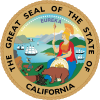California state-funded travel ban
| California state-funded travel ban | |
|---|---|
 | |
| California State Legislature | |
| Signed into law | September 27, 2016 |
| Sponsor(s) | Toni Atkins |
| Governor | Governor Gavin Newsom |
| Resolution | SB 447 |
California Assembly Bill 1887, or AB 1887, is a state statute that banned state-funded and sponsored travel to states with laws deemed discriminatory against the LGBTQ community. The bill includes exceptions for some types of travel the state has defined as necessary. Before the bill's repeal, travel to 23 states was banned.[1] The law passed on September 27, 2016,[2] and applied to four states.[3] It was repealed as per Senate Bill 447 on September 19, 2023.[4]
History
The law was designed to target states that passed laws deemed anti-LGBTQ, such as regulating bathroom access, with an economic boycott.[5] Evan Low authored the bill, with Toni Atkins being the primary sponsor.[6][7]
In 2016, the state of California began restricting travel to states with anti-LGBTQ+ laws after North Carolina passed the bathroom bill, a state statue transgender people from using restrooms and other public facilities that matched their gender identities.[8] In July 2022, Rob Bonta, the California Attorney General, announced that California would add more states to the restricted travel ban as a result of recently passed anti-LGBTQ+ laws in those states, leaving the count at 26 banned states.[8]
After the legislative passage of AB 1887, politicians from California continued to travel to banned states using campaign funds instead of state funds.[3] Sports teams from state colleges and universities have had to find private sponsors to fund travel to banned states where they compete.[3] Attendees of conferences have been affected.[9] In 2022, four states were added to the ban: Utah, Indiana, Louisiana, and Arizona.[10]
Repeal
Toni Atkins proposed a repeal of the bill in March 2023.[3] It was replaced in September 2023 with new legislation, the Senate Bill 447 (SB 447 or BRIDGE Project) signed into law, promoting inclusion with an advertising campaign.[11] SB 447 was nicknamed BRIDGE Project as an acronym for "Building and Reinforcing Inclusive, Diverse, Gender-Supportive Equality".[8]
In September 2023, a bill passed both houses (Assembly vote 64-12 and Senate vote 31-6) of the California Legislature that formally repeals the 7 year old travel-ban legislation. The Governor of California, Gavin Newsom, signed the bill on September 13, 2023.[4]
List of states banned

In July 2022, California had banned state-funded and state-sponsored travel to:
- Alabama
- Arizona
- Arkansas
- Florida
- Georgia (U.S. state)
- Idaho
- Indiana
- Iowa
- Kansas
- Kentucky
- Louisiana
- Mississippi
- Missouri
- Montana
- Nebraska
- North Carolina
- North Dakota
- Ohio
- Oklahoma
- South Carolina
- South Dakota
- Tennessee
- Texas
- Utah
- West Virginia
- Wyoming[1]
Exceptions
AB 1887 had exceptions from the ban travel:
- Enforcement of California law, including auditing and revenue collection.
- Litigation
- To meet contractual obligations incurred before January 1, 2017.
- To comply with requests by the federal government to appear before committees.
- To participate in meetings or training required by a grant or required to maintain grant funding.
- To complete job-required training necessary to maintain licensure or similar standards required for holding a position, in the event that comparable training cannot be obtained in California or a different state not subject to the travel prohibition.
- For the protection of public health, welfare, or safety, as determined by the affected agency, department, board, authority, or commission, or by the affected legislative office.[1]
See also
References
- ^ a b c "Prohibition On State-funded And State-sponsored Travel To States With Discriminatory Laws (Assembly Bill No. 1887)". State of California - Department of Justice - Office of the Attorney General. December 22, 2016.
 This article incorporates text from this source, which is in the public domain.
This article incorporates text from this source, which is in the public domain.
- ^ "California AB1887 | 2015-2016 | Regular Session".
- ^ a b c d "Democratic leader wants California to repeal ban on government travel to anti-LGBTQ states". Los Angeles Times. March 29, 2023.
- ^ a b "SB-447 GO-Biz: Building and Reinforcing Inclusive, Diverse, Gender-Supportive Equity Project.(2023-2024)". California Legislative Information. 2023. Retrieved 26 September 2023.
- ^ Karlamangla, Soumya (July 19, 2022). "Why California Bans State-Funded Travel to Nearly Half of States". The New York Times – via NYTimes.com.
- ^ "AB 1887 - California Assembly (20152016) - Open States". openstates.org.
- ^ Migdon, Brooke (2023-09-14). "Newsom signs bill ending California travel ban to states with anti-LGBTQ laws". The Hill. Retrieved 2023-09-15.
- ^ a b c Villarreal, Daniel (2023-09-13). "California may end its travel ban to states with anti-LGBTQ+ laws". LGBTQ Nation. Retrieved 2023-09-15.
- ^ "California's travel ban against anti-LGBT states is keeping athletes from games and students from conferences". Los Angeles Times. February 21, 2017.
- ^ Joyce, Tom (July 4, 2022). "California adds Arizona, other states, to no-travel list". The Center Square. Retrieved 2023-04-18.
- ^ Sheeler, Andrew (September 13, 2023). "California no longer bans state-funded travel to more than half of the country". Sacramento Bee.